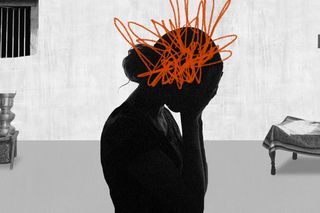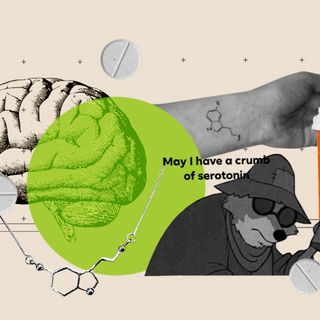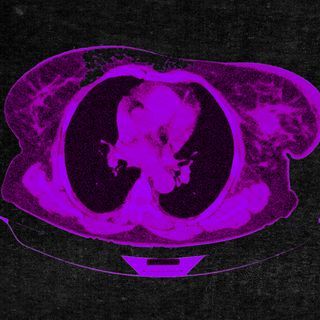
For Women, Children With Preexisting Mental Illness, Treatment Is Out of Reach During Covid19
“In a situation where people are unable to access items of essential well-being, mental illness is not considered a priority.”

In 2015, Rukmini* lost her house in Faridabad, Haryana, along with all her savings, to her husband’s gambling addiction. A domestic worker at the time, she also lost her job when she started experiencing sudden instances of being unable to breathe, “blacking out,” and hearing strange voices. Eventually, she had to take up the job of a rag-picker, but her symptoms — that were eventually diagnosed as anxiety, psychosis, and suicidal tendencies — persisted. It was only when her daughter Rajni* took her to a nearby doctor, that she was referred to the Institute of Human Behaviour and Allied Sciences (IHBAS) for psychiatric treatment, and she began receiving help.
That was until April, 2020, when Rajni found out that she could no longer reach the center via public transport due to a nation-wide, and now, a year later, city-wide lockdown. “When we tried to board a bus from near my place in Okhla, they asked us for an e-pass or a prescription. We didn’t know holding on to a prescription would ever be necessary. We don’t have smartphones to make an e-pass. I support my family and my extended family. There is no way I can afford an auto-rickshaw or taxi to IHBAS from Okhla, not with the money I have earned with the lack of jobs this year,” says Rajni.
She adds, “We have had no option but for her to stop taking her medicines this year… Since then, she has been forgetting things a lot. She has gone missing twice—one time, for an entire week, and she remembers nothing about that period … She keeps saying she does not want to live and we should not come looking for her if she gets lost again.” Rajni says they are now asking the local pujari, or priest, to visit them for treatment, as he only asks for a free meal in return.
Like Rukmini, many with mental health issues are struggling in the pandemic. This is not only due to the clampdown on public transport and resulting inaccessibility, but also because mental healthcare has taken a backseat owing to various socio-economic reasons.
“Mental illness and psychiatric disorders are already stigmatized as it is. In a situation where people are unable to access items of essential well-being, mental illness is not considered a priority. As a result, many patients are abruptly stopping their treatment, simply because they cannot reach the doctors,” says Dr. Gunja Sengupta, a senior resident of Psychiatry at Ram Manohar Lohia (RML) Hospital in New Delhi.
“Consequently, we are seeing an increase in cases of relapse,” adds Dr. Sengupta, pointing to the urgency of the issue.
Related on The Swaddle:
Every Sixth Victim of Suicide in India Is a Housewife
Relapse into a psychiatric illness that had seen improvement due to treatment is a cause of concern across the country, and many cases of relapse are going unreported. “This is especially a problem that is prevalent in rural areas, where psychiatrists have been re-assigned to Covid19 duty from psychiatric wards. We have observed cases of illnesses such as Obsessive-Compulsive Disorder (OCD) and schizophrenia worsening due to an abrupt stoppage in medicines that is being caused by a lack of doctors, leading to symptoms such as psychosis and hallucinations worsening,” says Dr. Mayuri Mohanty, a psychiatrist at Asian Institute of Medical Sciences (AIMS) Hospital, Mumbai. Such symptoms can be life-threatening in severe cases if left untreated.
To further exacerbate things, women with mental health issues often experience violence at home. And in 2020, the National Commission for Women (NCW) received the highest number of complaints of crimes committed against women in six years. This violence has led to a great sense of isolation amongst victims suffering from preexisting psychiatric disorders.
“Earlier, women and children had the option of getting out of their homes and speaking to their peers, or going to therapy if they were facing any kind of abuse. Now, they are locked in with their abuser, day in and day out. As a result, we have seen cases of women who were already suffering from psychiatric illness making impulsive decisions such as running away from home, rendering themselves at an even greater risk from factors such as relapse, recurring depressive disorder (RDD), suicidal tendencies, and more,” says Zareen Abbas, a psychiatric social worker at RML Hospital.
Related on The Swaddle:
Pandemic Isolation Intensified Gender Roles — and Women’s Anxiety, Depression: Study
Sonia*, a 27-year-old resident of the J.J. Colony in Madanpur Khadar, Delhi, has a similar story. She was a regular patient at a local psychiatric clinic until her ironing stall was shut down in lockdown and she could no longer afford it. “My husband and I had been taking therapy together after years of him beating me. Earlier, when he used to get drunk and beat me up, I would burn myself on the stove or run away from home. But the therapy helped control his anger a lot and we were doing much better. Now, with the lockdown, he gets drunk all day, beats me and my specially-abled child every night. I often want to end it all and kill myself, but then I think of my child,” Sonia says, as she tears up.
She adds that she is waiting for the lockdown to lift so that she can earn enough to go to the clinic again.
With adults struggling to cope, it can only be extrapolated how the pandemic has impacted children. Dr. Mayuri Mohanty believes that children are an especially vulnerable group at this point. “According to data, more than 80% cases of domestic violence go unreported. A large chunk of this comes from children, simply because they often do not have access to mechanisms to report abuse. I am afraid that this, which has increased so much in the lockdown, is going to lead to very complex grief presentation. We are already seeing such cases.”
Even before the pandemic, children were largely ignored when it comes to medical intervention for psychiatric illness or disorders. Now, the existing infrastructure to help children with special needs has also come crumbling down.
12-year-old Aarti*, who was diagnosed as being on the autism spectrum, attends a South Delhi school for children with special needs from low-income backgrounds. Unfortunately, activities in the school have mostly been suspended for more than a year, as most of its students cannot afford digital means for online classes. “It has been very difficult to keep her engaged at home. She was so much happier going to school. We feel like we are not enough for her,” says her mother, Meera Kumari.
A peer-engaging support system, which is essential for children’s mental health, has been largely missing owing to schools being shut or going online.
While independent helplines for reporting mental distress due to Covid-19 have emerged, there are no grassroots-level committees or government initiatives focusing solely on reaching out to people with psychiatric illnesses during this period. On an institutional level, mental healthcare remains a systematically ignored issue.
Given the scenario, doctors want to encourage seeking help through teleconsultations wherever possible. “I would like to request people not to stop their medicines without advice from their doctors, and opt for teleconsultations instead,” says Dr. Sengupta.
*Names of the patients have been changed to protect their privacy.
If you are someone or know someone who might need a mental health helpline during this time, please refer them to the following: Jeevan Aastha Helpline: 1800 233 3330; Vandravela Foundation: 18602662345 and +91-9999666555; One Life Foundation: 7893078930; Fortis Stress Helpline: +91-8376804102.
Ishita is a freelance editor, writer, poet, and content strategist. Her areas of interest include architecture and spaces in the city, queer, and women's rights issues, and mental health.
Related


How Serotonin Became the Internet’s Symbol for Hope and Happiness
